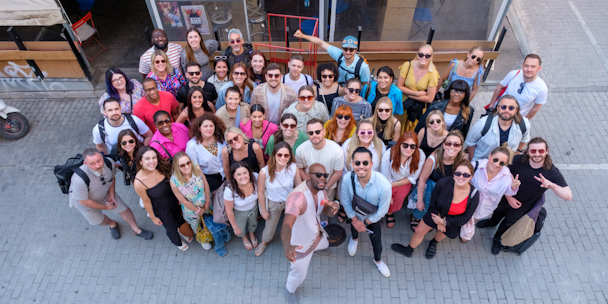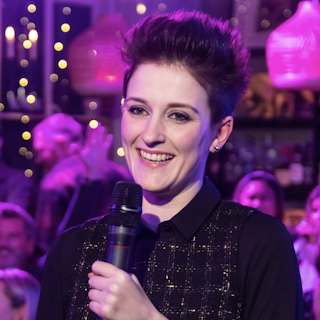How Manifest’s ‘fierce independence’ helped it win agency of the year
Ahead of The Drum Awards for Agency Business later this year, we caught up with “fiercely independent” creative agency Manifest – which won the Independent Agency of the Year (1-49 employees) in 2021 – to find out if it’s been building upon its winning formula.

The Manifest team
Manifest, led by founder and group chief executive Alex Myers since its inception in London in 2009, has since grown across the globe with studios now in New York, Stockholm, Manchester and Melbourne. It counts brands including Tommee Tippee, Chivas, Hotels.com, Logitech Dettol and Krispy Kreme among its clients. Notably, last year also saw its Tommee Tippee campaign The Boob Life (followed up this year by #TheTruthIs) rake in the golden gongs.
The Drum catches up with Bec Chelin, managing director, and Ali Maynard, managing partner, UK and Ireland, to see how the agency keeps to its winning ways. Answers have been edited for length and clarity.
What challenges have you faced since winning at The Drum Awards for Agency Business?
Chelin: There’s no denying the growing economic pressure for an awful lot of brands right now, and that’s not going to go away. While we have absolute certainty that the work we do can affect and effect positive change for brands, there’s pressure on clients internally to prove ROI more and more quickly. As an agency, we’ve got to work with clients to make sure the creative process is protected so that the very best work can be created and the best result achieved. But we also recognize that clients have those internal and economic pressures as well, and we can change and react to that by continually thinking and working in more innovative ways.
What does growth look like at Manifest?
Maynard James: We’re lucky that we have five studios right across the globe, and from the inception of the second office we’ve never wanted to be a network agency. We always want to be one global team, which means we can gather skill sets, expertise and talent from right across the globe and put teams on the right brief for the right response.
That also means we can navigate around economic pressures as well. If one market is particularly feeling under pressure, that means we work with the thriving markets to move the team resource or allocate work there.
Chelin: The same goes for creative work. It means that we’re not restricted by location or time zones anymore because we’ve got studios in three different time zones. It means we can effectively work across a 24-hour creative studio, and be more and more flexible for the brands that we work with.
What do you think of the network agencies? Any acquisitions planned?
Chelin: It’s not something we plan to do. We’ve been independent since inception, and we’ll continue to be because it’s allowed us to drive so much innovation behind the work that we do, and the way we work.
Whether that’s working as one group, rather than competing between offices for work or implementing new systems and processes. For example, we implemented an Elemental System of working since last winning at The Drum Awards, where we don’t have a standard hierarchy across our team. Instead, we set out teams in one of six elements or fields of expertise: insights, strategy, creative, creative production, client experience and project management. We divide the work across those elements rather than across the seniority of the team. And it means we get specialists right across the board in the right area of work, improving the quality of work, as well as the team and client experience.
Maynard James: The decision-making power goes with the expert in the field rather than the most senior person. If we were part of a network agency, we wouldn’t be able to implement that and we certainly wouldn’t be able to do it as quickly as we have been able to. Like setting up the Melbourne office in three weeks during the pandemic. It’s that pace of innovation that we would absolutely lose if we did merge.
What does agency culture look like at Manifest?
Chelin: Our team is the most important thing. It’s easy to say, but when client work is delivered to such a high standard, you look around and it’s because fundamentally we’ve got each other backs. We challenge and support each other, as well as promote the right behaviors, and we call out behaviors that detract from our culture.
Our appraisal systems are 360°, where everyone appraises absolutely everyone else because we’re a transparent culture. We’ve been doing a lot of work with the teams recently on transparency and compassionate curiosity in terms of how we communicate with one another to build a culture where we absolutely trust each other and are transparent in our ways of working.
Maynard James: All that goes to contribute to our culture that is based on trust. That doesn’t mean to say it works all the time, and there is still a tonne of things that we need to iron out, but we want to treat people as a team of expert grown-ups and not mandate too much where it’s not needed.
Talent acquisition has particularly been an arduous task for agencies in the past few years. How is Manifest finding the right people to work with?
Maynard: We have strict processes. Everyone’s aware of the merry-go-round that is the post-pandemic change where people are sat in roles a little bit, then afterward it’s time for a change.
It’s busy out there, there’s a lot of chatter and movement, and you must be rigorous and have the right processes and structures in place with the right team members and the right candidates. We found it hard not because there’s a shortage of people out there or because of competition around pay, but because we work very hard to identify who the right people are for culture and creative fit.
Chelin: We want to hire people that we can invest in and find roles for people where they weren’t in those roles previously – whether that’s a client need or a team need, or even if it’s a new service offering that fits a new career path that people want to explore. We’ve had people join from the account manager level and are now heading up our insights department. We’ve had people join at the exec level and are now one of the managing partners.
I don’t think you get that in many agencies – you see quite a linear path. And it’s surprising to a lot of people when they first join. We say to them to have a think about what they want to do because if there’s a need for it, we can train you, develop that and you can bring that passion and skill set. We know that when people are working within their passions and skill sets, it doesn’t even feel like work half the time.
How has winning The Drum Awards helped your business?
Chelin: There’s no doubt that it absolutely helped our business. Our people and work do the talking. We don’t do traditional marketing ourselves - through our Slant platform, everyone across the team is invited to put opinion pieces out without any censorship - but when we do it’s important that it’s worth it. Awards are worth it and to be part of The Drum Network, and a group of peers who can celebrate each other’s work, is something to be proud of.
While The Drum Awards for Agency Business 2022 has closed for entries, extensions are available now.

